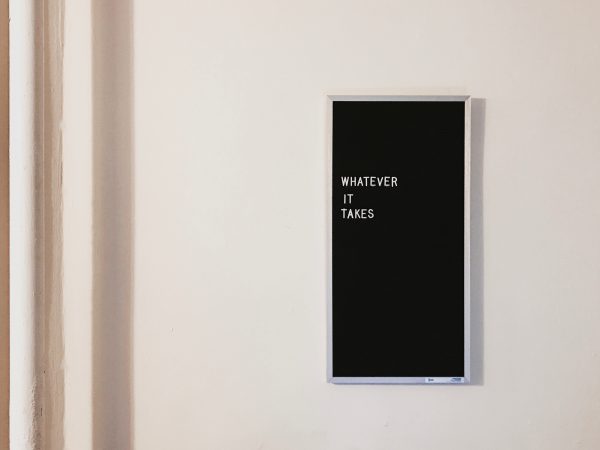What Is Self-Efficacy and What Does It Have to Do With Money?
Yesterday Billfolder L. Luna shared a link to an article at The Cut titled The Trait That Determines Whether You’re Good With Money.
I thanked L. Luna for the tip, noting that I hadn’t seen that article yet… and in the past 24 hours I’ve now seen it, as well as numerous other posts discussing the concept of “self-efficacy,” everywhere.
So let’s add ours to the pile!
Here’s how Charlotte Cowles explains the new self-efficacy study, at The Cut:
The concept of “self-efficacy” is easy to love, partly because it just makes sense. Coined in the 1960s by psychologist Albert Bandura, it’s defined as “one’s belief in one’s ability to succeed in specific situations or accomplish a task,” and generally correlates with higher performance in said task.
Self-efficacy sounds like it’s dangerously close to the Dunning-Kruger Effect, but I shouldn’t interrupt. What else do we need to know?
Newly published research from a ten-year study of more than 2,000 students at the University of Arizona found that financial self-efficacy correlated more strongly with subjects’ financial well-being than almost any other factor, including gender, race, and socioeconomic background. The conclusion: being “good with money” isn’t just a matter of spending less than you earn — it’s a mind-set.
Cowles clarifies that it’s not so much about thinking that you’re good with money (because a lot of us think we’re better at things than we actually are, see Dunning-Kruger, above), but instead deciding that you’re going to be good with money. You’re going to learn what it means to be good with money, and then do what a person who is good with money might do. [Editor’s note: Read Billfolder Lorelai’s comment to get a better understanding of what self-efficacy is and how it applies to personal finance. It’s not just about deciding to be good with money; it’s also about believing that you can learn what you need to learn.]
And then you’ll succeed. Because why wouldn’t you?
![]()
When you go to the source, an APLUS study titled Approaching 30: Adult Financial Capability, Stability and Well-Being, you learn that they don’t view self-efficacy as the only factor required to be good with money:
Within APLUS, we define personal financial agency as measures of three beliefs:
- Perceived behavior control — how challenging one thinks it is for her/him to stick to a financial plan, measured with one question on a scale from 1 (extremely difficult) to 7 (very easy);
- Planning horizon — how far out one thinks she/he needs to plan ahead to see better financial outcomes (longer horizons signaling greater financial agency), measured with one question on a scale from 1 (next few days) to 7 (longer than 10 years);
- Financial self-efficacy — how confident one is that she/he can perform a particular behavior (e.g., pay my bills), measured by three questions on a scale from 1 (strongly disagree) to 5 (strongly agree).
I like that they defined it as “personal financial agency,” which implies that your ability to manage your finances largely depends on your ability to manage your finances. If your income and expenses are so variable that you can’t stick to a financial plan, or if you can’t guarantee that you’ll be able to pay your bills on time, or if your life is at a point where it is difficult to make long-term plans, it makes sense that you would have less capacity to plan or control where your money goes.
The study notes that its subjects’ financial self-efficacy dropped as they neared their 30s, in part because they were making more complex financial decisions and were less sure about which choices were the “right” ones. Although self-efficacy was a stronger indicator of financial stability than gender/race/SES, there were still varying levels of financial agency and self-efficacy among people of different genders, races, and socio-economic backgrounds, and they fall along the lines you’d expect: men report higher levels of agency and self-efficacy than women do, white people report higher levels than people of color, people from high socio-economic backgrounds report higher levels than people from lower ones.
![]()
So. It seems to me — and I fully admit that I’ve spent, like, 30 minutes with this study, so there’s a lot of Dunning-Kruger going on here — that the APLUS research proves three points:
- Deciding to make proactive decisions about your money helps improve your financial situation.
- But you have to have financial agency — i.e. the ability to make choices about where your money goes — before you can decide to make those decisions.
- Wealth, privilege, and systemic disenfranchisement all play a role in your ability to make choices about where your money goes.
I don’t think any of this is particularly new information, but since it’s packaged as “people who decide they’re going to be good with money are better with money,” it feels a little fresher than “um… there’s still a lot of race/gender/socio-economic inequality going on.”
I’ll end with two questions:
- Did you decide to be good with money? I know I did, years before I ever started with The Billfold (I got this gig in part because I’d been sharing and tracking my freelance income on Tumblr).
- If you read the study, what do you think?
Support The Billfold
The Billfold continues to exist thanks to support from our readers. Help us continue to do our work by making a monthly pledge on Patreon or a one-time-only contribution through PayPal.

Comments